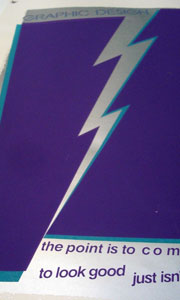In praise of competence (stumbling toward brilliance)
We know brilliance when we see it. It's the painting or photo, book or movie that shows us something as we've never seen it before. More than a pleasurable experience—though it may be that—brilliance changes our life.
Since I'm a designer, I'm always looking for brilliant design. Because design is more pragmatic and commercial than what we call art, brilliance may be harder to find, but it's there. A handful of designers are reliably brilliant, like Milton Glaser, Paula Scher and Stefan Sagmeister.
Many designers are occasionally brilliant, a list too long to attempt.
And finally there's a huge roster of designers who are competent but not brilliant. That's the list I'm on. I don't say this out of humility and I'm not fishing for compliments. I've seen enough art and design, brilliant and otherwise, to know where my work fits in this scheme of things.
I'm good at what I do, occasionally very good, but I've never created anything brilliant. Nothing unforgettable or life-altering. That used to be discouraging, but I've finally come to terms with it. Rather late in life I now realize that I'm a good designer, nothing more. I need to keep working, doing the best I can, and hope that I'll stumble into brilliance one day.
Is ordinary good enough?
I recently saw a discussion on Quora.com titled "How do you come to terms with the fact that you're just ordinary?" The answers fall into three categories: "Stop asking the question," "Ordinary is good enough," and "Being extraordinary has its drawbacks, too."
Revlin John says:
"Maybe I have come to terms with my 'ordinary' status. I guess at some point I saw that box on my stat sheet, and decided to erase the check mark."
Luis Gabriel Montalvan Aleman writes:
"There is nothing wrong with being ordinary, truly amazing things have been done thanks to ordinary actions. Hug someone, smile at someone, help someone. You might be the catalyst of something extraordinary by doing that. Never underestimate your capacity to change the world one way or another.
Nigel Tunnacliffe points out:
"I think it is important to remember that for most people, the more successful they are in one way, the less successful they are in other ways. Some examples:
• Many intellectual geniuses have poor social skills;
• Many of the hottest people are not particularly intelligent;
• Many of the most successful executives are not very relaxed; etc."
Ordinary or competent?
Similar thoughts: "When you are a pretty good designer you are actually infinitely better than no designer at all."
Read more at Friendly Design Company. [Added 9/27/13]
Maybe I should go with being ordinary, but that seems to be setting the bar too low. I prefer competence. As a designer, a father, husband, and human being, I want to "do something successfully or efficiently". Competence seems to be both an achievable and worthy goal in any line of work.
When I take my car to the repair shop, I want the mechanic to be competent: successful and efficient. I don't care if he/she is the greatest mechanic in the world, as long my car runs properly.
If I go to the dentist, I want him/her to fix what's causing my toothache. Quickly. I don't need the most creative or cutting-edge technique in dentistry, I just want a filling or root canal done right. That's competence.
Design as a service
I'd argue that design isn't all that different from car repair or dentistry. It's a valuable service that needs a skilled provider. A company needs a logo, a new restaurant needs a website: jobs to be done. In a sense, things to be fixed. A competent designer is needed, not necessarily a brilliant one.
Hire me, and if I do my job successfully and efficiently your letterhead communicates the image you want, potential customers see your menu online and come to your restaurant. You pay me a reasonable fee. If I've been very successful, the result is aesthetically pleasing and enjoyable.
That's competence. For the longest time it left me feeling unsatisfied. I wanted my work to win awards and accolades from my peers. Truth is I still want that, but no longer need it. I'm OK with doing a good job that meets peoples' needs.
What about creativity?
What about that magic elixir that's needed in art and design? Doesn't the spark of creativity make our work different from that of other professionals? I'm not sure what my dentist or mechanic would say, but I know that creativity is highly valued in design. We all strive to "have our work characterized by originality and expressiveness."
Yes, but...there's nothing mystical about creativity. It's a talent we all have. It can be developed with study and practice. It's not magic, and it's not doled out in fixed amounts so that you either have it or you don't. Some people seem to be more creative to start, but they have to work at it too.
It always comes back to work, to doing one's job. Michelangelo was working for Pope Julius II when he painted the Sistine Chapel. Art now, but a job then. A job done brilliantly.
Back to work
With a goal of being competent, have I abandoned all desire to be brilliant? No. But I now understand that the most important thing is to just keep working. Keep doing the best work that you can, as much as you can. In the design world, to get the message across.
As I sweat the details of my latest project I keep this in mind: the point is to communicate, not just look good. If I do a really good job, the work will both communicate and be beautiful. If the message itself is meaningful, I may achieve brilliance.
Hasn't happened yet, but I'm going to keep trying.
